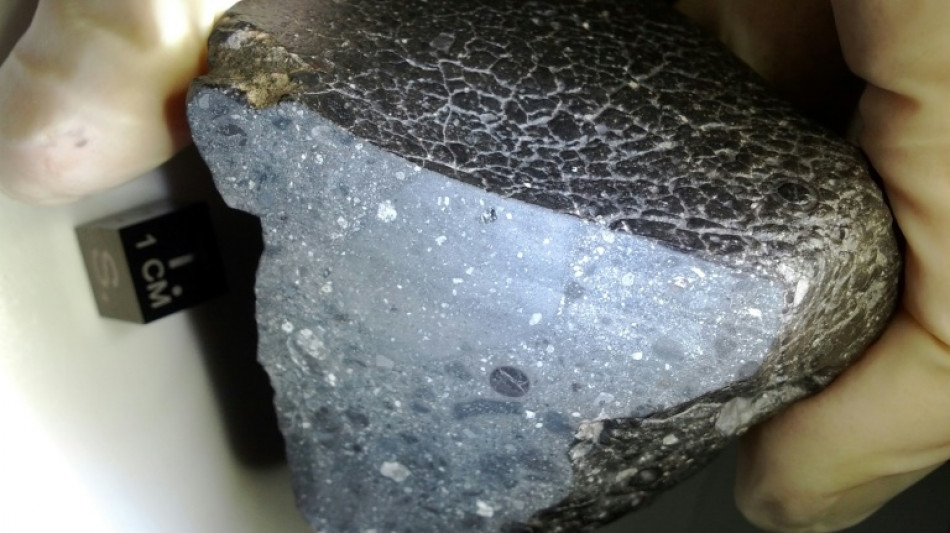
-
 Iran to press capital crime charges for 'rioters': prosecutors
Iran to press capital crime charges for 'rioters': prosecutors
-
Denmark, Greenland set for high-stake talks at White House

-
 Iranian goes on trial in France ahead of possible prisoner swap
Iranian goes on trial in France ahead of possible prisoner swap
-
Cold winter and AI boom pushed US emissions increase in 2025

-
 Hong Kong activist investor David Webb dies at 60
Hong Kong activist investor David Webb dies at 60
-
Try to be Mourinho and I'll fail: new Real Madrid coach Arbeloa

-
 Vingegaard targets Giro d'Italia and Tour de France double
Vingegaard targets Giro d'Italia and Tour de France double
-
South Korean prosecutors demand death penalty for ex-leader Yoon

-
 Iwobi hails Nigerian 'unity' with Super Eagles set for Morocco AFCON semi
Iwobi hails Nigerian 'unity' with Super Eagles set for Morocco AFCON semi
-
Le Pen appeal trial opens with French presidential bid at stake

-
 Iran ex-empress urges security forces to join protesters
Iran ex-empress urges security forces to join protesters
-
Sudan 'lost all sources of revenue' in the war: finance minister to AFP

-
 Freezing rain hampers transport in Central Europe
Freezing rain hampers transport in Central Europe
-
Nuuk, Copenhagen cautiously mull Greenland independence

-
 'Proving the boys wrong': Teenage racers picked for elite driver programme
'Proving the boys wrong': Teenage racers picked for elite driver programme
-
Mbappe absent from training as Arbeloa takes charge at Real Madrid

-
 Iran worries push up oil price as world stocks diverge
Iran worries push up oil price as world stocks diverge
-
Volvo Cars pauses battery factory after fruitless partner search

-
 Social media harms teens, watchdog warns, as France weighs ban
Social media harms teens, watchdog warns, as France weighs ban
-
Central bank chiefs voice 'full solidarity' with US Fed, Powell

-
 Greece airspace shutdown exposes badly outdated systems
Greece airspace shutdown exposes badly outdated systems
-
France climate goals off track as emissions cuts slow again

-
 Boeing sells 50 737 MAX jets to leasing group ACG
Boeing sells 50 737 MAX jets to leasing group ACG
-
Freezing rain paralyses transport in Central Europe

-
 Man Utd reach deal to appoint Carrick as interim boss: reports
Man Utd reach deal to appoint Carrick as interim boss: reports
-
Trump hits Iran trade partners with tariffs as protest toll soars

-
 Is China a threat to Greenland as Trump argues?
Is China a threat to Greenland as Trump argues?
-
Takaichi says urged S. Korea's Lee to help 'ensure regional stability'

-
 South Korean prosecutors set to demand heavy sentence for Yoon
South Korean prosecutors set to demand heavy sentence for Yoon
-
Honduras electoral authorities reject vote recount

-
 Tractors in Paris to protest EU's trade deal with S. America
Tractors in Paris to protest EU's trade deal with S. America
-
Asian markets rise, Iran worries push up oil

-
 Williams loses golden oldie clash in final Australian Open warm-up
Williams loses golden oldie clash in final Australian Open warm-up
-
Kyrgios stands by decision to skip Australian Open singles

-
 Disaster losses drop in 2025, picture still 'alarming': Munich Re
Disaster losses drop in 2025, picture still 'alarming': Munich Re
-
Williams, 45, loses in first round of final Australian Open warm-up

-
 Doncic scores 42 points but Lakers humbled by Kings
Doncic scores 42 points but Lakers humbled by Kings
-
'Serious threat': Indonesia legal reform sparks rights challenges

-
 Rodgers misery as Texans rout Steelers to advance in NFL playoffs
Rodgers misery as Texans rout Steelers to advance in NFL playoffs
-
Morocco's Bono 'one of best goalkeepers in the world'

-
 Salah and Mane meet again with AFCON final place on the line
Salah and Mane meet again with AFCON final place on the line
-
French museum fare hikes for non-European tourists spark outcry

-
 In 'big trouble'? The factors determining Iran's future
In 'big trouble'? The factors determining Iran's future
-
Osimhen finds AFCON scoring touch to give Nigeria cutting edge

-
 Trump announces tariffs on Iran trade partners as protest toll rises
Trump announces tariffs on Iran trade partners as protest toll rises
-
Sabalenka favourite at Australian Open but faces Swiatek, US threats

-
 Gay Australian footballer Cavallo alleges former club was homophobic
Gay Australian footballer Cavallo alleges former club was homophobic
-
Global Sports Brand U.S. Polo Assn. Announced as Official Jersey and Apparel Sponsor for the Legendary Snow Polo World Cup St. Moritz

-
 Trump has options on Iran, but first must define goal
Trump has options on Iran, but first must define goal
-
Paris FC's Ikone stuns PSG to knock out former club from French Cup

| SCS | 0.12% | 16.14 | $ | |
| CMSD | -0.32% | 23.79 | $ | |
| BCC | -0.19% | 82.72 | $ | |
| BCE | -0.27% | 23.77 | $ | |
| RIO | 1.03% | 83.72 | $ | |
| RELX | -0.51% | 42.55 | $ | |
| RYCEF | -0.93% | 17.29 | $ | |
| NGG | -2.37% | 77.91 | $ | |
| JRI | 0.1% | 13.814 | $ | |
| VOD | -2.08% | 13.274 | $ | |
| RBGPF | 1.13% | 82.5 | $ | |
| CMSC | 0.17% | 23.31 | $ | |
| AZN | -0.39% | 93.265 | $ | |
| GSK | -1.63% | 49.57 | $ | |
| BTI | 0.2% | 55.79 | $ | |
| BP | 1.43% | 34.895 | $ |

Scientists find oldest Martian meteorite's original home
Scientists announced Tuesday they had found the crater from which the oldest known Martian meteorite was originally blasted towards Earth, a discovery that could provide clues into how our own planet was formed.
The meteorite NWA 7034, nicknamed Black Beauty, has fascinated geologists since it was discovered in the Sahara Desert in 2011.
It fits easily in the hand, weighing just over 300 grams (10.6 ounces), and contains a mix of materials including zircons, which date back nearly 4.5 billion years.
"That makes it one of the oldest rocks studied in the history of geology," Sylvain Bouley, a planetary scientist at France's Paris-Saclay University, told AFP.
Its journey dates back to the solar system's infancy, "about 80 million years after the planets began forming", said Bouley, who co-authored a new study on the meteorite.
Tectonic plates long ago covered up Earth's ancient crust, meaning that "we have lost this primitive history of our planet", Bouley said.
But Black Beauty could offer "an open book on a planet's first moments", he added.
To open that book, a team of researchers at Australia's Curtin University set out to find the meteorite's original home on Mars.
They knew that it was likely an asteroid hitting the red planet that sent Black Beauty shooting up into space.
The impact "had enough force to eject the rocks at very high speed -- more than five kilometres (three miles) a second -- to escape the Martian gravity", Curtin's Anthony Lagain, the lead author of the study in Nature Communications, told AFP.
Such a crater would have to be massive -- at least three kilometres in diameter.
The problem? The pockmarked surface of Mars has around 80,000 craters at least that big.
- Following the clues -
But the researchers had a clue: by measuring Black Beauty's exposure to cosmic rays, they knew it was dislodged from its first home around five million years ago.
"So, we were looking for a crater that was very young and large," Lagain said.
Another clue was that its composition showed it had suddenly heated up around 1.5 million years ago -- likely by the impact of a second asteroid.
The team then created an algorithm and used a supercomputer to trawl through images of 90 million craters taken by a NASA satellite.
That narrowed it down to 19 craters, allowing the researchers to rule out the remaining suspects.
They found that Black Beauty was dug up from its first home by an asteroid that struck around 1.5 billion years ago, forming the 40-kilometre Khujirt crater.
Then a few million years ago, another asteroid hit not far away, creating the 10-kilometre Karratha crater and shooting the Black Beauty towards Earth.
The region in Mars' southern hemisphere is rich in the elements potassium and thorium, just like Black Beauty.
Another factor was that Black Beauty is the only Martian meteorite that is highly magnetised.
"The region where Karratha was found is the most magnetised on Mars," Lagain said.
Known as the Terra Cimmeria—Sirenum province, it is "a relic of the early crustal processes on Mars, and thus, a region of high interest for future missions," the study said.
Bouley pointed to a "bias" in the currently planned missions to Mars in favour of searching for signs of water and life.
But to understand how planets first form would answer some fundamental questions, Lagain said, including "how Earth became such an exceptional planet in the Universe".
Y.AlMasri--SF-PST




